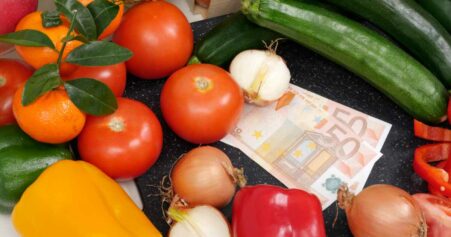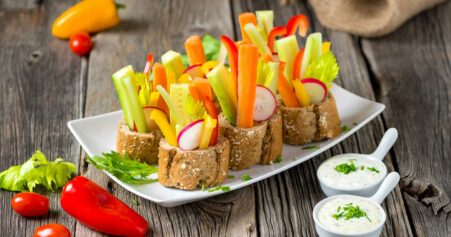Table of Contents
Vegans know where their bread is buttered. They know that they do not want animals to suffer for their pleasure. So they choose vegan alternatives for butter. But what are they, and is vegan butter healthy?
Did you know …
… that the production of 1 kg of butter causes almost 24 kg of CO2 equivalents – more than 100 times the amount caused by 1 kg of potatoes (Fritsche and Eberle, 2007)?
Butter Production
Butter production is very resource intensive: On global average, 1 kg of butter requires a total of 5,555 L of water, while 1 kg of vegetables requires only 322 L. Although the latter has a larger water footprint on a per-calorie basis, because butter does not provide significant amounts of micronutrients in the quantities used, these must be taken in with other foods. If nuts are used as a comparison, they need more water at 9,000 L/kg, but at the same time provide more micronutrients and more nutritionally important fats, which must still be consumed in addition to butter. Butter therefore provides no nutritional benefit other than energy and the nutrient fat, but consumes large amounts of water and energy.
When you consider that it takes 25 liters of fresh milk to produce one kilogram of butter, the amount of resources required becomes even more apparent. Then there are the many energy-intensive processing steps required to turn the white liquid into concentrated fat, including centrifugation, standardization and pasteurization, churning and blending (Rimbach et al., 2015). All these steps are not necessary for vegan butter. As a result, its production is much more environmentally friendly.
These are the three types of butter:
- Sweet cream butter is made from fresh cream.
- Mildly cultured butter is made by kneading a lactic acid concentrate into this sweet cream after churning (beating the cream in a butter churn in a rotating cylinder until the fat separates from the buttermilk).
- Sour cream is made from cream that has been pasteurized and pre-ripened with lactic acid bacteria.
To be labeled as “German butter”, it must contain a minimum of 82 % fat and a maximum of 16 % water (Rimbach et al., 2016; BZfE.de, 2019). American butter is churned for a shorter time and therefore has a slightly lower fat content (80 %).
Vegan Butter Alternatives
Whether used as the only spread on bread, under cold cuts, in baking or frying: Many people enjoy using butter on a regular basis. If you would like to avoid animal-based butter, there are a number of options available to you.
Special Vegan Butter
Although butter is legally defined as a product of animal origin derived from milk, there are plant-based alternatives that closely resemble butter in texture and taste and are commonly known as vegan butter substitutes. Since they cannot officially be sold as “butter”, you will find them called “(vegetable) margarines”.
These products consist of palm and coconut fats, sunflower oil, water, color concentrates, emulsifiers, and lemon oil, for example. Palm and coconut fats are used because of their high melting point. However, the production of these fats comes with negative environmental consequences.
The nutritional value of the vegan butter is similar to that of conventional butter. Depending on the fat used, it may contain less saturated fatty acids and more medium-chain fatty acids. This kind of vegan butter cannot be considered “healthy” because it does not contain any really health-beneficial ingredients. But remember that one food cannot be classified as healthy or unhealthy. It is all about the whole diet and every food can be included in a healthy diet.
Vegetable Margarine
In addition to vegan butter, you can also use regular vegetable margarine. This is because many of them are vegan. They have a different texture than conventional or vegan butter. But be careful, as some may also contain ingredients of animal origin (such as yogurt, whey, fish oil, beef tallow, dairy fats, yogurt cultures, or non-vegan vitamins) (Hamatschek, 2016). You can use vegan vegetable margarine like butter on bread, in baking, or in cooking. Because it is easier to spread, a smaller amount usually ends up on the bread, so you consume fewer calories than when using butter. This could be beneficial to your health if it helps you maintain or reach a healthy body weight.
The basic ingredients of vegetable margarine are vegetable oils (mostly rapeseed and sunflower) and fats, water, salt, emulsifiers, and flavorings. Some types also contain vitamins and colorings. If you want to be sure that flavors, vitamins, and emulsifiers are vegetable-based, look for margarine that is specifically labeled as vegan. You can also find information about vegan products on the Internet or in apps.
It is also worth noting that plant-based margarines have a smaller negative impact on the environment than butter. In a study, researchers calculated that the production of margarine has about half the potential for global warming, eutrophication (introduction of substances into soils and water bodies with harmful environmental effects) and acidification (reduction of pH in water bodies) as butter (Nilsson et al., 2010). The production causes about 1,350 g CO2/kg, while butter causes more than 23,000 g (yumda, 2014). In addition, according to this calculation, the land required for butter production is on average twice as large as for vegetable margarine production (Nilsson et al., 2010).
Other Vegan Butters or Alternatives
If you do not want to switch to vegan margarine, there are other ways to replace butter. Below you will find an overview of the different uses and possible alternatives to butter.
On Bread
You can also use pure coconut fat or coconut oil as a spread. This is especially tasty on toasted bread. However, especially the oil melts quickly, so it is not directly comparable to butter. Coconut oil does not have a good fatty acid composition, so it is not really a healthy alternative to butter.
If you use butter not so much for the taste, but to keep the bread from getting too “dry” or to keep the cold cuts from sticking to the bread, you can use vegan “cream cheese,” mustard, pesto, or nut butter. This may save you some calories and saturated fat, depending on how much you use, and could therefore be a healthier alternative.
For Baking
Instead of butter, use nut butter or cocoa butter in cakes, muffins, and other baked goods. If you prefer lower fat, you can choose a vegetable oil and reduce the recommended butter amount. Alternatively, you can use applesauce: You will only need about half the amount called for. This would add some fiber and micronutrients and can therefore be considered a healthy vegan butter alternative. Since many people do not like the texture of fat-free baked goods, you can add a little oil.
For Frying
For frying in a pan, there is a special vegetable frying cream that is a kind of liquid margarine. It is available in some countries, like Switzerland and Germany. It is easier to measure and spread than margarine, and manufacturers say it splatters less than oil. However, pure vegetable oil is the best substitute from a health standpoint.
If you are using a non-stick pan, however, you often do n’o need any fat at all for frying, or much less than many people think. So unless you really want the taste of fat, you can greatly reduce the amount of frying fat you use. Even if the taste and consistency are different, you can simply steam the food or use the oven and bake the food originally intended for frying in a casserole dish or on a baking sheet, depending on the type. This helps you reduce calorie intake and retain more vitamins and minerals in your food.
Conclusion: Is Vegan Butter Healthy?
In fact, there is no need for butter, or even a special substitute for it, as it is merely an additional source of fat. As a result, its use may result in unintended caloric intake or be at the expense of nutritionally valuable fatty acids. The ingredients in vegan butter are mostly saturated fats, which can be harmful to your health if consumed in large amounts, increasing the risk of cardiovascular disease.
However, when the properties of butter are needed (for example for flavor or texture), there are vegan butter alternatives. While they are nowhere near as resource-intensive and climate-damaging as the version of animal origin, they are still quite heavily processed and therefore energy-intensive to produce.
Our recommendation: Use vegan butter sparingly if you miss the taste of butter, and otherwise use other alternatives as a spread, when baking or frying. This way, vegan butter can be healthy.








Leave a Reply